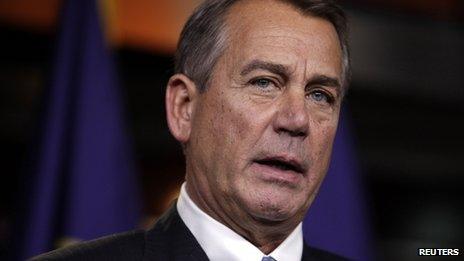US 'fiscal cliff': Boehner pulls Republican tax reform plan
- Published
- comments

US Republicans have cancelled a tax vote in Congress, less than two weeks before a deadline for budget reform.
Republican House speaker John Boehner proposed the bill, which would have raised taxes on high earners. But right-leaning Republicans rejected it.
Analysts say the rejection has weakened Mr Boehner's position in negotiations with the White House.
Politicians need to agree fiscal rules by 1 January, or steep tax rises and deep spending cuts will take effect.
Analysts say the so-called fiscal cliff could take the US into recession.
Despite the failure of the vote, major stock markets were little changed, as most analysts had expected this to be a long, drawn out process. European markets were down in the first half hour of trading, but by less than 0.5%.
Veto threat
Mr Boehner said he had been unable to garner sufficient votes to secure passage of the bill.
Although it would have ensured a tax cut for 99.8% of Americans, it would have imposed a rise on those earning more than $1m (£600,000).
He said in a statement that the bill "did not have sufficient support from our members to pass".
Shortly after, the White House said President Barack Obama would work with Congress.
The White House statement said it was "hopeful that we will be able to find a bipartisan solution quickly".
Earlier on Thursday, the House narrowly passed a companion bill that would cut domestic spending while protecting the defence budget.
The House is controlled by the Republicans, but the Senate is Democrat-led.
Mr Boehner's plan would have had little chance of passing a Senate vote.
Analysts say it was in effect an effort to tell the US public that the Republicans should not be blamed if a deal could not be reached.
But some believe that the White House has now been strengthened by Mr Boehner's failure.
'Exercise in futility'
White House spokesman Jay Carney earlier said Mr Boehner's plan was a "multi-day exercise in futility at a time when we do not have the luxury of exercises in futility".
Mr Boehner announced the bill on Tuesday, saying he would bring forward a measure that extended Bush-era tax cuts for those earning less than $1m per year - but would not address the automatic spending cuts.
On Wednesday, the Republican leadership added a companion bill that would replace the automatic cuts with a proposal to remove cuts from defence and government operating budgets. They would be offset by reductions elsewhere in the budget.
The proposal would cut food stamps, benefits for federal workers and some social services programmes.
Mr Obama had sought tax rises for the wealthy, but was pushing for a lower threshold of $400,000.
He also offered a change to the way Social Security cost of living adjustments are made for some recipients, cuts from government healthcare programmes and a two-year extension of the debt ceiling.
Mr Boehner's office called the proposal "a step in the right direction" but not fully "balanced".
Analysts have painted a grim picture of the consequences of going over the cliff, with some warning that the impact could push the US back into recession.
The Organization for Economic Co-operation and Development (OECD) said in its latest economic outlook that the recession from the cliff could become global.